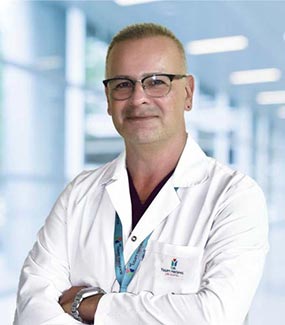Obesity And Sleeve Gastrectomy
You Can Get Rid of Excessive Kilos and Recover from Diseases by Obesity Surgery Methods!
We are waiting for you for a FREE physician’s opinion to improve your life quality with Obesity Surgery Team of Yaşam Hospitals Group.
After a certain level, obesity results in diabetes and hypertension, and these complications rise in very early ages in “morbid” obese people. These accompanying problems, which develop due to obesity, are called as “comorbidity” in medicine. As it is known, the first reason of death is still arteriosclerosis today, and both diabetes and hypertension are the most important risk factors for the development of arteriosclerosis. Therefore, if morbidly obese people are not treated, they may die at a much earlier time than those at the same age due to arteriosclerosis and reasons such as heart attack (infarction) or stroke that may develop in connection with it.
Risk Of ObesityThe expression “If they are not treated” is used because there is good news! That is to say that today it is possible to treat morbid obesity by a series of laparoscopic, i.e. “closed” surgeries, if it is not often solved by strong will, diet and precautions. These operations, which are known as “bariatric surgery” in medicine and can be defined as surgical interventions to treat fatness, are life-saving and life-extending interventions that pose lower risk than thought. Therefore, despite the risks they expose the patient, they are applied very actively and much more frequently around the world. It is due to the fact that these interventions have been demonstrated to considerably extend the life of the patient and to greatly improve the life quality as well as to provide rapid recovery from other accompanying problems such as Type II diabetes and hypertension. Today, the second most commonly performed laparoscopic surgeries in U.S.A. are bariatric interventions after gallbladder surgeries. Why is morbid obesity dangerous?Moreover, some cancer types, including breast, colon (large intestine), pancreas and kidney, are more commonly observed in obese people. Gallbladder stones and related problems are also observed significantly more frequently in obese people. Decrease fertility in affected women, polycystic ovary syndrome, cataract formation, lumbar problems and other orthopedic problems, varicose veins, various hernia types are observed more frequently in obese people. Beyond Type II diabetes and hypertension, severe knee problems, urological problems such as urine incontinence, respiratory distress and a number of very severe problems such as sleep apnea at very early ages cannot be avoided, and the fact that this group of patients of which the majority is young cannot perform their daily routine tasks without help at a very young age is sad, for sure. These people become unable to sit in all seats, get into every vehicle, cross their legs, and they even need help to perform their daily simple needs and even personal cleaning. Only these are enough for development of severe depression and social isolation. |  |
Why are the diets not very successful in patients with obesity?
Low-calorie diet is the primary treatment of obesity. The person should have firstly attempted to diet at least twice before undergoing obesity surgery. Unfortunately, weight loss obtained by diets cannot be maintained for a long time. Diets may result in specific biological reactions in the body, which cause regaining weight. When the diet is started, weight is lost to a certain extent and then a weight loss plateau is reached. It is because of the fact that the energy balance (metabolism) is affected. When a person loses weight by a low-calorie diet, the body reduces energy consumption as it thinks that it is starving. This requires getting even fewer calories to maintain weight loss. This is not much sustainable. Furthermore, low-calorie diet activates appetiteregulating mechanisms such as the desire to eat in the long term. This weight loss plateau is broken at a certain point; however, the person regains all the weight lost in short term, and may even gain more than the weight lost. This is called yoyo syndrome. The studies have shown that the rate of permanent weight loss by diets is not higher than 3%.. A person, who has never tried a diet in his/her life, should take this chance and try it even if this rate is 3%. The common history of the patients applying for obesity surgery is that they have been experiencing yoyo syndrome several times.
 | What Is Bariatric Surgery?Obesity is a condition in which the weight of the person does not fall within the healthy weight range, and the person reaches a weight that threatens his/her health seriously and becomes unable to perform his/her daily routine tasks due to being overweight. Obesity limits physical activities, and it imposes too much physiological pressure on people. In today’s societies, there is a sensitivity to overweight and unfortunately, some segments of the society exclude overweight people. The people being exposed to such reactions may become introverted and withdraw, and become psychologically depressed. We come across with the ever-increasing news in both local and global media. Being overweight limits the person’s physical activities, while it causes several diseases from cardiovascular diseases to liver disorders. Therefore, in case of exceeding a certain weight limit, the treatment process should be initiated by the support of an expert without further destruction of the body. Otherwise, in case of progression of health problems associated with being overweight, it will become unavoidable to enter an irreversible process. |
Diseases Caused By Obesity
Obesity causes numerous health problems due to its negative effects on body systems (endocrine system, cardiovascular system, respiratory system, gastrointestinal system, skin, genitourinary system, musculoskeletal system) and psychosocial status. The relationship between obesity and various diseases is known, and its effect on increasing the morbidity and mortality has been demonstrated. Overweight is responsible for more than 1 million deaths and 12 million life-years of ill health in the Europe Region each year.
You can fight against these diseases by only overcoming obesity:
•Type 2 diabetes
• Coronary artery disease
• Hypertension
• Heart failure
• Sleep apnea
• Respiration diseases
• Gastroesophageal reflux
• Depression
• Infertility
• Menstrual irregularity
• Osteoarthritis
• Varicose vein
• Cerebral hemorrhage and paralysis
• Gallbladder stone
•Some of the cancer types such as breast, colon and prostate cancer
• Urinary incontinence
• Sleep disorders
• Labor difficulties
• Polycystic ovarian syndrome
• Hirsutism
• Social disharmony
• Metabolic syndrome
• Insulin resistance
• High cholesterol and lipid
The obesity classification of World Health Organization is used to determine the obesity and it is generally measured by Body Mass Index (BMI). The Body Mass Index is calculated by dividing the weight in kilograms by the height in meters squared. Morbid obesity is a condition in which BMI is higher than 40 kg/m2.
Who Can Undergo Sleeve Gastrectomy?Sleeve gastrectomy is performed for overweight people who have exceeded the danger limit by calculation of height to weight ratio. Prior to the operation, patients undergo various health checks to determine whether they are suitable for surgery. Taking into consideration the weight limit and health problems, the patients meeting the criteria may undergo gastric bypass and begin healthy and rapid weight loss. As well as the body mass index, the weight circumference measurement is also used in determination of obesity danger. It is also known that adipose tissue is no longer a simple storage form, but also secretes hormonal and chemical substances that act on all systems. The affect of these secretions is as further worsening the obesity, and they cause increase in appetite, while pushing forward the satiety limit. It is of importance where fat tissue is collected in the body. The fat accumulated around the belly is considered to be more dangerous than that accumulated in the hiplines and hips. Therefore, the risk of suffering especially a cardiovascular disease is higher in fat patients with apple-type accumulation than the fat patients with pear-type accumulation. Shortly, when waist circumference exceeds 94 cm in men and 80 cm in women, it indicates increased risk, and when it exceeds 102 cm in mean and 88 cm in women, it indicates higher risk. Apart from these initial measurements, metabolic rate measurements and detailed body analyses also help obtaining more detailed information on the obesity problem of the person. According to the studies made, one quarter (25%) of Turkish men and almost half (44%) of Turkish women were found to have obesity. Being much lower 10 years ago, it has now doubled in men, and increased from 40% to 50% in women over 50 years old. Bariatric surgery is primarily based on two principles; reduction of gastric volume and/or ‘malabsorption’, which means preventing the absorption of foods at certain stages. We can define the morbid obesity also as excessive obesity which may cause fatal problems as a result of the risks it exposes to the person and thus shorten the life expectancy significantly. These extremely fat people should undergo surgery in case that they cannot lose weight permanently despite all diets and precautions, which is very rare and may be successful only in 2-3% of the patients. You can obtain this value by dividing your weight by the height in meters squared. Body Mass Index (BMI). |  |
What is Body Mass Index (BMI)?
BODY MASS INDEX (BMI) = Weight / Height (meter) x Height (meter)
Given that your weight is 100 Kg and your height is 180 cm: BMI = 100/1.82, i.e. 100/ 3.24 and the result is: 30.8 . In this case, your BMI is roughly “31” ‘. According to World Health Organization, those with BMI between 20-25 are referred to as “normal”; 25-30 as “over-weighted”; as in the above example, 30-35 as obese or “fat”, 35-40 as “type II obese”, and BMI higher than 40 is referred to as “morbidly obese” that is to be fat which can be considered as sickness.




